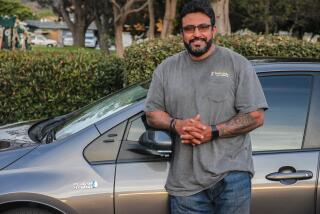AUTOS : Nissan is turning over a new zero-emission Leaf : The electric car, which made its U.S. debut Friday in L.A., is set to go on sale in select markets next year and go global in 2012
- Share via
On the vast expanse of asphalt outside Dodger Stadium, Nissan Motor Co.’s new electric car made its U.S. debut Friday, zipping quietly through a maze of orange cones on its way to what the Japanese automaker hopes will be the top of the clean transportation class.
The Nissan Leaf, a five-seat, zero-emission hatchback, will start filtering into select markets in the U.S., Europe and Japan next year and will go global in 2012 at a price just 1% to 2% higher than similar-size vehicles, the carmaker said. Industry estimates range from $25,000 to $33,000 for the car, which runs on a lithium-ion battery pack placed under the floor and has a 100-mile range after an eight-hour charge.
“There is an appetite, a spontaneous demand for something that would represent a break from the past,” said Nissan Chief Executive Carlos Ghosn, who also heads car manufacturer Renault.
“This is not a golf cart -- it’s a real car,” he added.
Chargers inside customers’ home garages will be the primary method of powering up the cars, but Nissan has been planning a network of Leaf charging stations with public and private partners.
So far, Nissan has cut 33 deals around the world, with stations set for San Diego; Sonoma County; Portland, Ore.; Seattle; Tucson; Phoenix; Washington, D.C.; Raleigh, N.C.; and in Tennessee.
On Friday, Nissan announced an agreement to develop a charging infrastructure in Texas with Houston-based Reliant Energy, a subsidiary of electricity giant NRG Energy Inc. The deal could involve Reliant home charging packages offered through Nissan, said NRG Chief Executive David Crane.
The Leaf battery, which can be quick-charged to 80% capacity in 30 minutes at special charging stations or fully charged overnight using a 220-volt socket, will be leased separately at a rate that Ghosn said would be less than the cost of gasoline.
As one of the first companies to mass-market the battery, Nissan is in discussions to sell the system to other automakers, Ghosn said; he didn’t rule out the possibility of also eventually using a third-party battery manufacturer.
With the roughly 110-horsepower electric motor, the Leaf can reach about 90 mph and go from zero to 60 mph in less than 10 seconds, Nissan executives said.
The company took out $1.6 billion in loans from the U.S. Department of Energy to revamp its factory in Smyrna, Tenn., for Leaf production. The first models on sale will be imported from Japan.
“This technology is expensive at the beginning, due to scale,” said Ghosn, who nevertheless added that Nissan intends to make a profit off the car.
With oscillating oil prices, the “guilt-free driving” offered by the Leaf is especially appealing to a younger, eco-friendly generation, Ghosn said. He cited Nissan research showing that 8% of Americans say their next car will be electric.
“We will make money out of the Leaf,” Ghosn said.
“We have to make money, because if we don’t make money, the technology is condemned.”
Critics, though, have suggested that Nissan is placing a huge bet on Leaf, a potentially risky proposition with little precedent.
And competition exists, whether from the hybrids released by Toyota Motor Corp. and Honda Motor Co. this year or the battery-run Chevrolet Volt expected from General Motors Co. next year.
The Leaf could be the first of several zero-emission cars from Nissan, including a four-seat Infiniti compact, Ghosn said. That would spread out the cost of development and manufacturing, he said.
Most vehicles will still be using gasoline engines in 30 to 40 years, experts say.
But Ghosn predicts that electric vehicles will account for up to 10% of all car sales by 2020. And that’s assuming there won’t be an oil crisis or climate catastrophe that speeds the trend, he said.
“We’ll still be a producer of internal combustion vehicles for a very long time,” he said. “But the trend of evolution of electric cars is going to be much faster than the trend of evolution of traditional cars.”
Charging stations will be ready in selected areas once the Leaf hits the mass market in 2012, said Hal Snyder, vice president of customer solutions with San Diego Gas & Electric Co., which linked up with Nissan in March.
The first 1,000 Leaf buyers in San Diego will get a free charging system, he said.
As electric vehicle technology matures, the current 551-pound weight of the battery probably will drop and the electricity that powers the cars increasingly will come from solar, wind and other renewable sources.
The Leaf could even discharge excess energy back into the grid, Snyder said.
The Leaf was first trotted out at Nissan’s Yokohama headquarters Aug. 2.
A sky-blue show model and a drivable prototype will visit 22 cities in 11 states over the next three months, starting with four days in Los Angeles and then four days in Orange County and San Diego. The vehicles will end their tour in New York on Feb. 14.
As for that name -- Nissan described it in August as “a significant statement about the car itself. Just as leaves purify the air in nature, so Nissan Leaf purifies mobility by taking emissions out of the driving experience.”
--
--
(BEGIN TEXT OF INFOBOX)
Nissan Leaf
Drivetrain: All-electric
When available: Late 2010 in select markets; mass production is slated for 2012
Price: $25,000 to $33,000 (estimated)
Top speed: 90 mph
Charging time: 4 to 8 hours at a home charging unit
Range: 100 miles
Sources: Nissan, Times research







